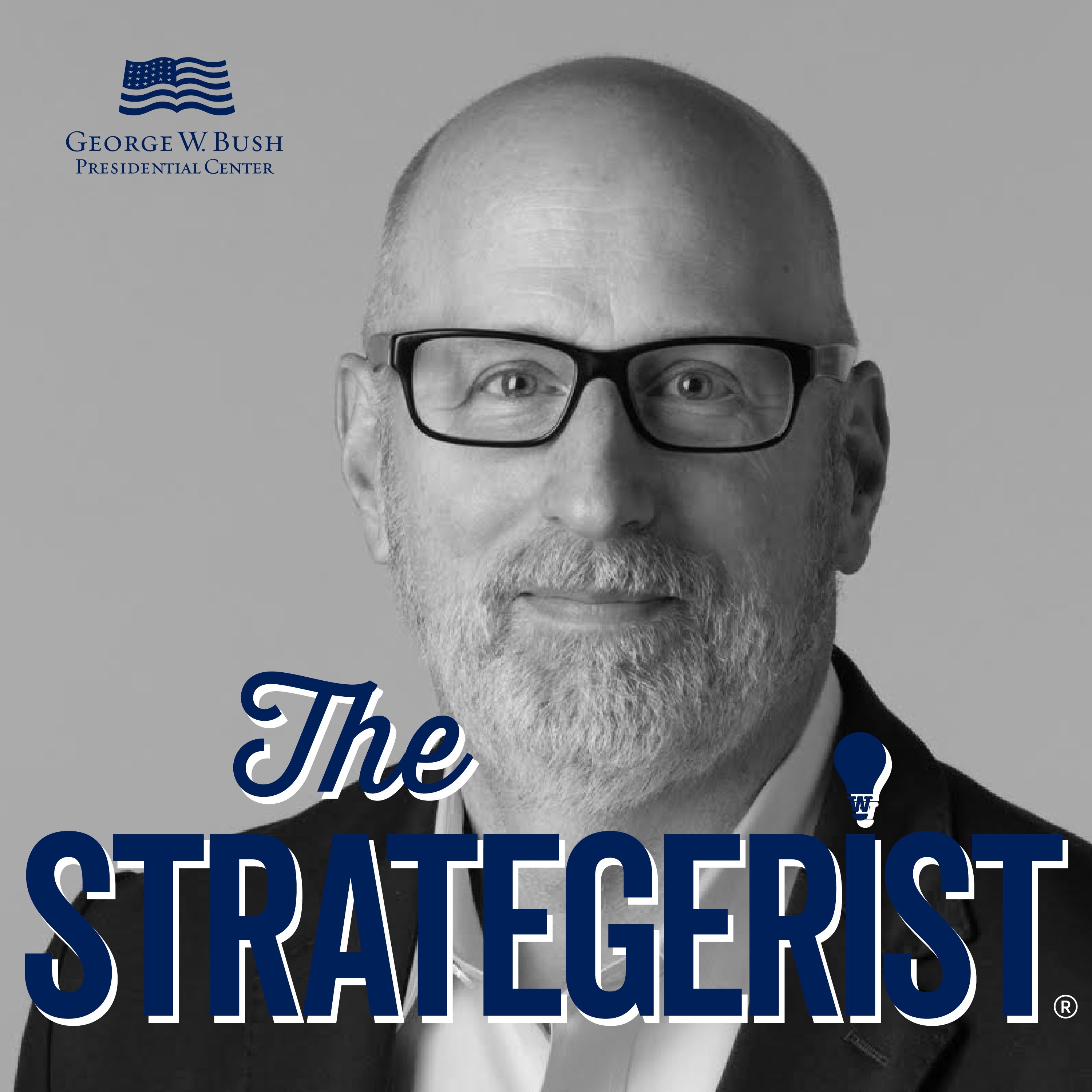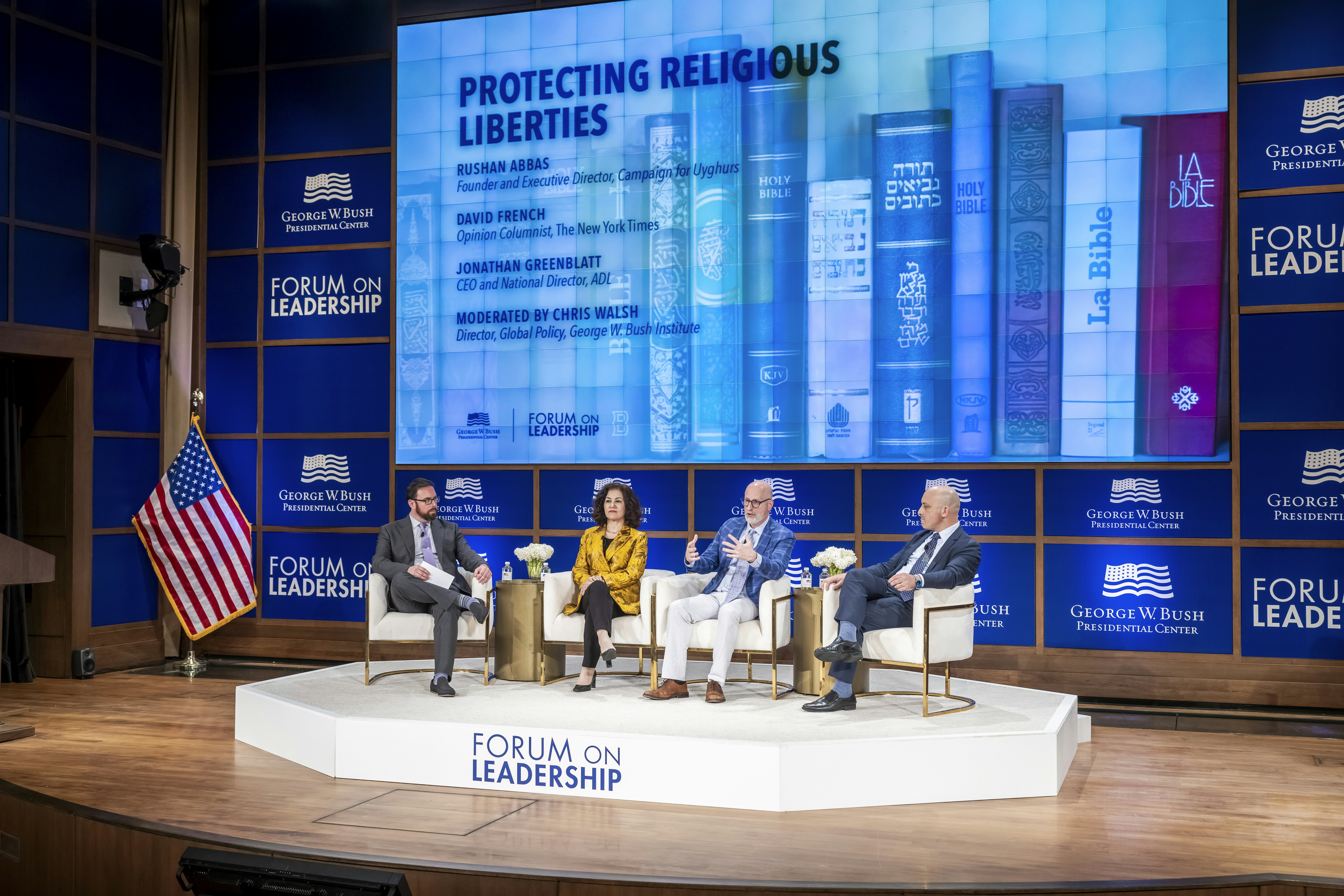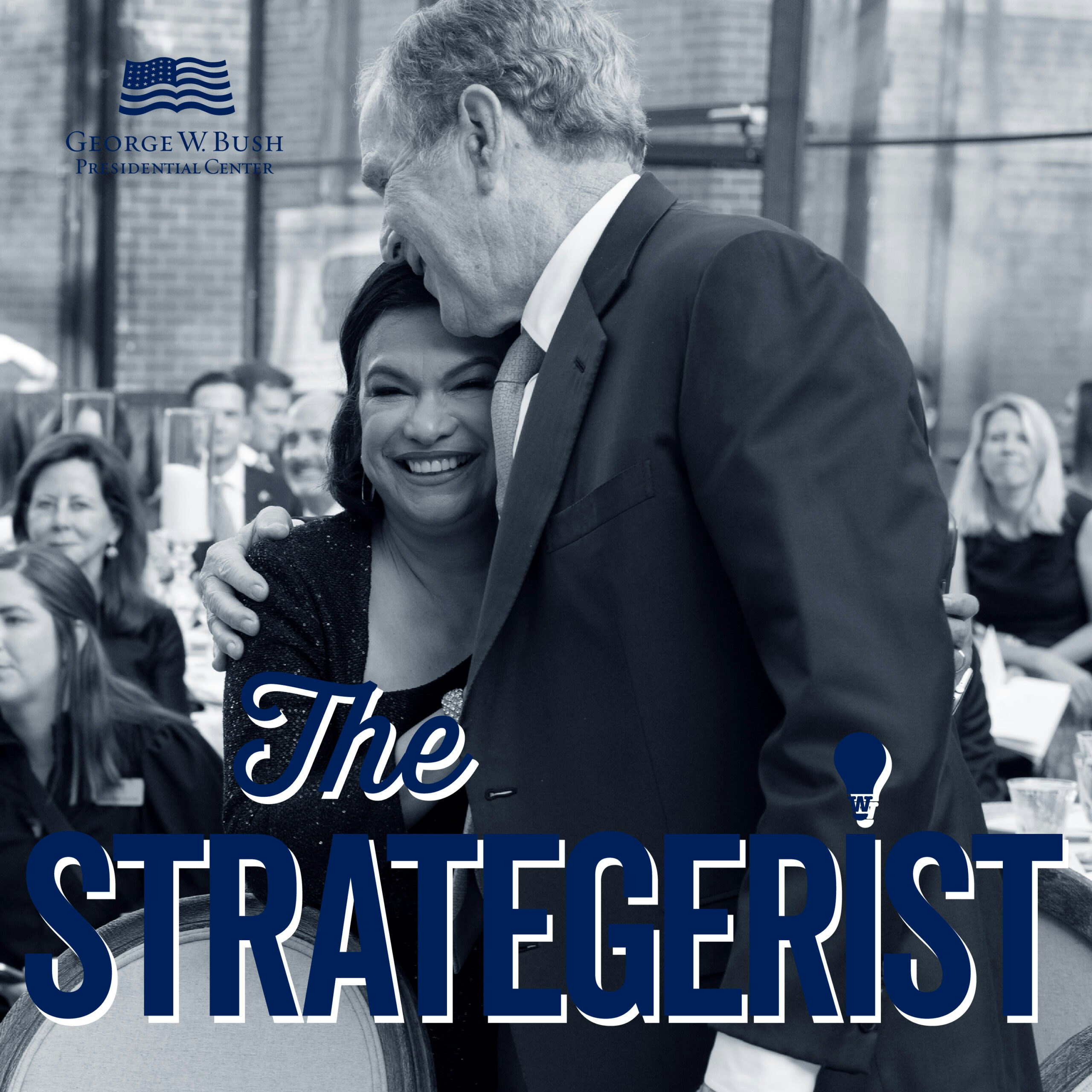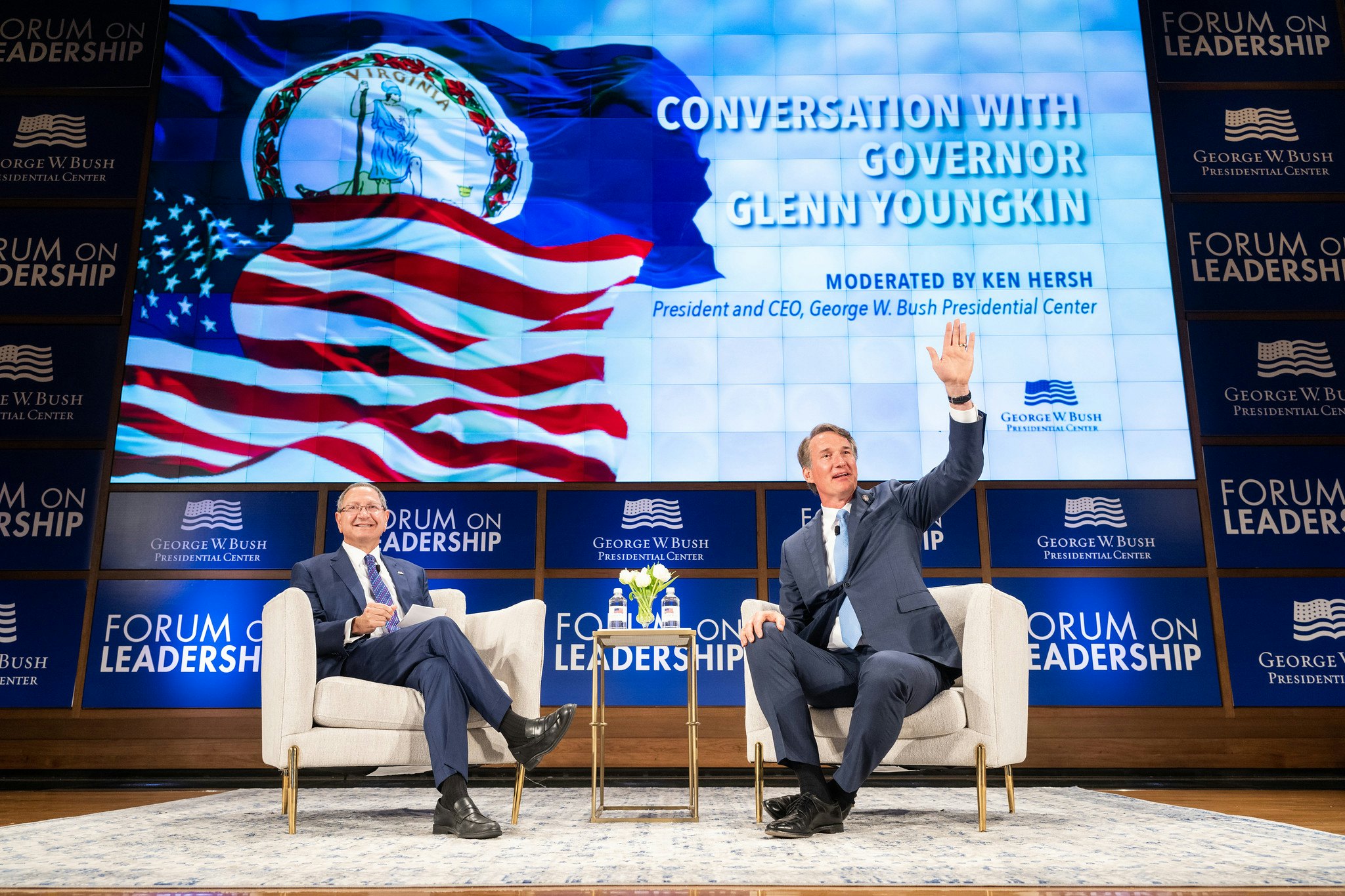Watch our favorite moments from the 2024 Forum on Leadership, a landmark gathering that develops, recognizes, and celebrates leadership by bringing together notable voices for in-depth discussions on today’s pressing issues.
1. Distinguished leadership
“For those of us with freedom comes responsibility. An awesome responsibility. That in addition to the words in the founding documents, we need to feel the truth of what’s at stake.”
— Former PepsiCo Chairman and CEO Indra Nooyi, recipient of the 2024 George W. Bush Medal for Distinguished Leadership
2. America’s hand to play
“I’d much rather have our hand to play than anybody else’s because I think ours is a stronger hand, not least I think because of its democratic foundations. As cocky and confident as a lot of authoritarian regimes can become, they understand very well some of the challenges and insecurities that they face at home, too. This is a moment when our relative power in the world is not quite as dominant as it was at the end of the Cold War, but it’s still quite significant. And, again, if we invest in allies and partners if we recognize the competition in emerging technologies that’s really going to shape the future of our economy and our military, I think we’re quite capable of winning these competitions as well.”
— CIA Director William J. Burns
3. The importance of religious pluralism
“It’s pluralism or war when it comes to religious differences. History has taught us this over millennia. That when you’re dealing with a conflict between peoples who have very deep profound beliefs with eternal implications, that any attempt to dominate – of one religious people group – to dominate and suppress another religious people group, leads to war. It leads to some of the most vicious conflicts we have seen in world history.”
— David French, The New York Times opinion columnist who identifies as an evangelical Christian
4. On girls’ education in Afghanistan
“I have teachers who are showing up in Kandahar right now in a basement, and they are teaching girls. I have 100 girls who are coming up to that school and who are learning biophysics and chemistry. We had our first batch of 30 girls who just graduated from grade 12. This has happened for the first time in the past two and a half years in Afghanistan. I have women who are showing up to school in a hospital basement in Helmand… My goal is 3,400 women leaders in the next 10 years. We’re going to do much much more.”
— Pashtana Durrani, Founder and Executive Director of LEARN Afghanistan
5. On modeling U.S. values to the world
“What we should be modeling is not perfection. It is instead openness about our system of debate and discussion. I don’t need consensus. I need constructive disagreement. That’s what we’re not doing well. We should embrace our disagreements. Take them on constructively. That’s the message that we want the rest of the world to see. Not unity. Not lockstep. But instead that in the marketplace of ideas, you can disagree. It’s OK. It’s how you get to the right answer, and it’s how you reshape yourself. We have made mistakes. We should never engage in self-flagellation. We should fix them. Take them on and show the world this is what a democracy can do that no authoritarian system can do.
— Mark Green, President, Director, and CEO of The Wilson Center
6. The problem of antisemitism
“Antisemitism is not a Jewish problem. I mean, of course it is. Hating people because they’re Jewish, hating someone because they’re a Zionist, hating someone because of how they pray, of course that affects the victim. But antisemitism is symptomatic of a kind of antiliberalism – of a sickness in the society. What I worry about, and I think all Americans need to worry about, is a society that accepts antisemitism and the scapegoating and slander that goes with it; it’s a sign of an unraveling.”
— Jonathan Greenblatt, CEO and National Director of ADL
7. On technological threats
“Data transcends borders, no matter where you are. We’re here talking about freedom and liberty and democracy. And in a world where we have so many conflicts and yet so much love, data can transcend all of that and put our lives at risk.”
— Vishal Amin, General Manager, Defense Security Solutions at Microsoft
8. On the importance of U.S. global development programs
“China is in many places where either we’ve seen a lack of United States engagement or we’ve seen U.S. engagement but China just comes in in a bigger way. They are cutting deals which are undercutting the democratic development in a lot of countries in Africa, in Latin America, in other regions. They are cutting really bad deals which are pinning these countries to a debt trap in many, many places. And part of that debt trap is also tying the infrastructure of these countries – their ports, their railroads, their airports – to Chinese investment. And quite often then leaving and leaving these countries worse off than they were before.
“And the signal that many of these countries are getting quite often when they don’t have leaders that are representing the people’s interest is well, China is there for us. We have a choice as the United States to say what is the partnership we want to have with these countries? What voices do we want speaking into these nations and the partnerships we want to develop with these nations. Because that’s where many of these nations are choosing to turn. And they have a choice. And if the United States is not there, it will be other countries.”
— Nicole Bibbins Sedaca, the Kelly and David Pfeil Fellow at the George W. Bush Institute and Executive Vice President for Strategy and Programs at Freedom House
9. On transnational repression
“I spoke about this [Uyghur] atrocity in September 2018 at Hudson University, exercising my First Amendment right, my freedom of speech in the United States, as an American citizen, talking about the [Chinese regime’s] genocidal policies. Six days after that, they took my own sister as a hostage. Basically, my freedom of speech cost her her freedom. She’s in jail right now. She’s a retired medical doctor. Five years, seven months, and eight days she is in prison. Today, I am here talking to you at the cost of my sister’s freedom.”
— Rushan Abbas, Founder and Executive Director of Campaign for Ughurs
10. On the reality of life in authoritarian North Korea
“I saw my father die of starvation when I was 12 years old. My older sister in that same year was sold to a man in China, and my mom was sent to a prison camp. So suddenly I went from having a loving family to become essentially no one, orphaned and homeless on the street. I did everything I could do to stay alive at 12 years old. That included begging food from strangers on the street, stealing food, working in coal mines….
“One of my favorite sayings in English is `Change is inevitable, but growth is optional.’ Everyone’s definition of what growth is can be different. But I hope that all definitions of growth include caring for others.”
— Joseph Kim, Expert-in-Residence and Program Manager of Global Policy at the George W. Bush Institute

















